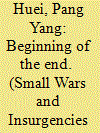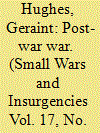|
|
|
Sort Order |
|
|
|
Items / Page
|
|
|
|
|
|
|
| Srl | Item |
| 1 |
ID:
071969


|
|
|
|
|
| Publication |
2006.
|
| Summary/Abstract |
The 'Nixon Doctrine,' announced on 25 July 1969, which emphasised the singularity of US interest over all others, was a reflection of US war weariness and the President Richard Nixon's political constraints. The net effect was the unilateral withdrawal of troops in phases and Vietnamisation returning combat responsibilities to the South Vietnamese. Indeed, negotiations and diplomacy fell short of expectations, failing to force the North Vietnamese to abandon their objectives. However, Vietnamisation, the third leg of Nixon's strategy, became the most visible of Nixon's failures. Such was the debacle that Nixon was sorely tempted to simply walk away concluding, 'Vietnamization has been completed and [South Vietnam President Nguyen Van] Thieu then can do what he likes.'
|
|
|
|
|
|
|
|
|
|
|
|
|
|
|
|
| 2 |
ID:
071972


|
|
|
|
|
| Publication |
2006.
|
| Summary/Abstract |
Attempts to disrupt the flow of funds through Africa used to finance terrorism have been hindered by terrorists utilizing satellite telecommunications in conjunction with hawala, an ancient system of fund transfers based on trust. This arrangement leaves few records for tracing transactions, a task made even more difficult by the general paucity of investigators trained in the languages commonly used for hawala. Acquiring personnel with the appropriate linguistic skills is one of the steps agencies can take to reduce the terrorist financing that occurs through this unique blend of an ancient system with modern technology.
|
|
|
|
|
|
|
|
|
|
|
|
|
|
|
|
| 3 |
ID:
071970


|
|
|
|
|
| Publication |
2006.
|
| Summary/Abstract |
Many authors contend that ethnic extremism coupled with political manipulation were the primary factors behind the Rwandan genocide. Yet, to oversimplify the cause of this tragedy makes one blind to the complicated nexus that generated the outcome. Even though this genocide was quick in its execution, the events that lead to this massacre took years to unfold. We argue that the evolution of human capital and the competition for scarce resources contributed to the genocide.
|
|
|
|
|
|
|
|
|
|
|
|
|
|
|
|
| 4 |
ID:
071967


|
|
|
|
|
| Publication |
2006.
|
| Summary/Abstract |
Major General Orde Wingate was a highly controversial figure in his time and remains so among historians. However, his eccentric and colourful personality has drawn attention away from the nature of his military ideas, the most important of which was his concept of long-range penetration, which originated from his observations of his operations in Italian-occupied Ethiopia in 1941, and evolved into the model he put into practice in the Chindit operations in Burma in 1943-44. A review of Wingate's own official writings on this subject reveals that long-range penetration combined local guerrilla irregulars, purpose-trained regular troops and airpower into large-scale offensive operations deep in the enemy rear, with the intention of disrupting his planning process and creating situations regular forces could exploit. This evolved organically from Major General Colin Gubbins' doctrine for guerrilla resistance in enemy occupied areas, and bears some resemblance to the operational model applied by US and Allied forces, post September 2001.
|
|
|
|
|
|
|
|
|
|
|
|
|
|
|
|
| 5 |
ID:
071968


|
|
|
|
|
| Publication |
2006.
|
| Summary/Abstract |
This article examines the history of Operation Masterdom, the occupation of Southern-Indochina by British-Indian forces commanded by Major-General Douglas Gracey during the autumn and winter of 1945-46. It summarises the factors which led to the occupation force's embroilment in the struggle between the French and the Viet Minh, and compares and contrasts Masterdom with the present political and strategic problems faced by the US-led coalition in Iraq.
|
|
|
|
|
|
|
|
|
|
|
|
|
|
|
|
| 6 |
ID:
071973


|
|
|
|
|
| Publication |
2006.
|
| Summary/Abstract |
The political side of counterinsurgency has long been recognized as more important than the military side. The major works on counterinsurgency call for political reform that redresses legitimate insurgent grievances. Thereby, insurgents are encouraged to pursue their aims via political instead of military means. In western Iraq, insurgent perceptions of US weakness inhibited effective political reform. Moderate Sunnis did not engage the Coalition or Iraqi government until these perceptions had been revised. The connection between insurgent perceptions and effective political reform deserves greater attention. With the exception of some arguments from the political science field, the literature on counterinsurgency insufficiently addresses the importance of insurgent perceptions.
|
|
|
|
|
|
|
|
|
|
|
|
|
|
|
|
| 7 |
ID:
071971


|
|
|
|
|
| Publication |
2006.
|
| Summary/Abstract |
Pakistan confronts numerous domestic security challenges including jihadist extremism, Sunni-Shi'a sectarian violence, drug trafficking, illegal commodity smuggling, endemic corruption, and systemic problems with the provision of justice and law enforcement. While much has been written about US military assistance to the Government of Pakistan (GOP) and the ever-evolving political relations between the two countries, basic questions of highest policy significance related to Pakistan's internal security have never been fully studied or considered. This essay begins to address these empirical lacunae. It first provides a comprehensive examination of Pakistan's internal security environment and the effectiveness of the GOP's criminal justice structures in dealing with these challenges. The paper then goes on to assess the impact and utility of the current suite of US law enforcement assistance in helping to fortify Pakistan's domestic security environment. The study raises a number of difficult questions pertinent to the long-term impact of this support, particularly in terms of its effect on fostering a viable, accountable and transparent system of civilian governance and policing.
|
|
|
|
|
|
|
|
|
|
|
|
|
|
|
|
|
|
|
|
|